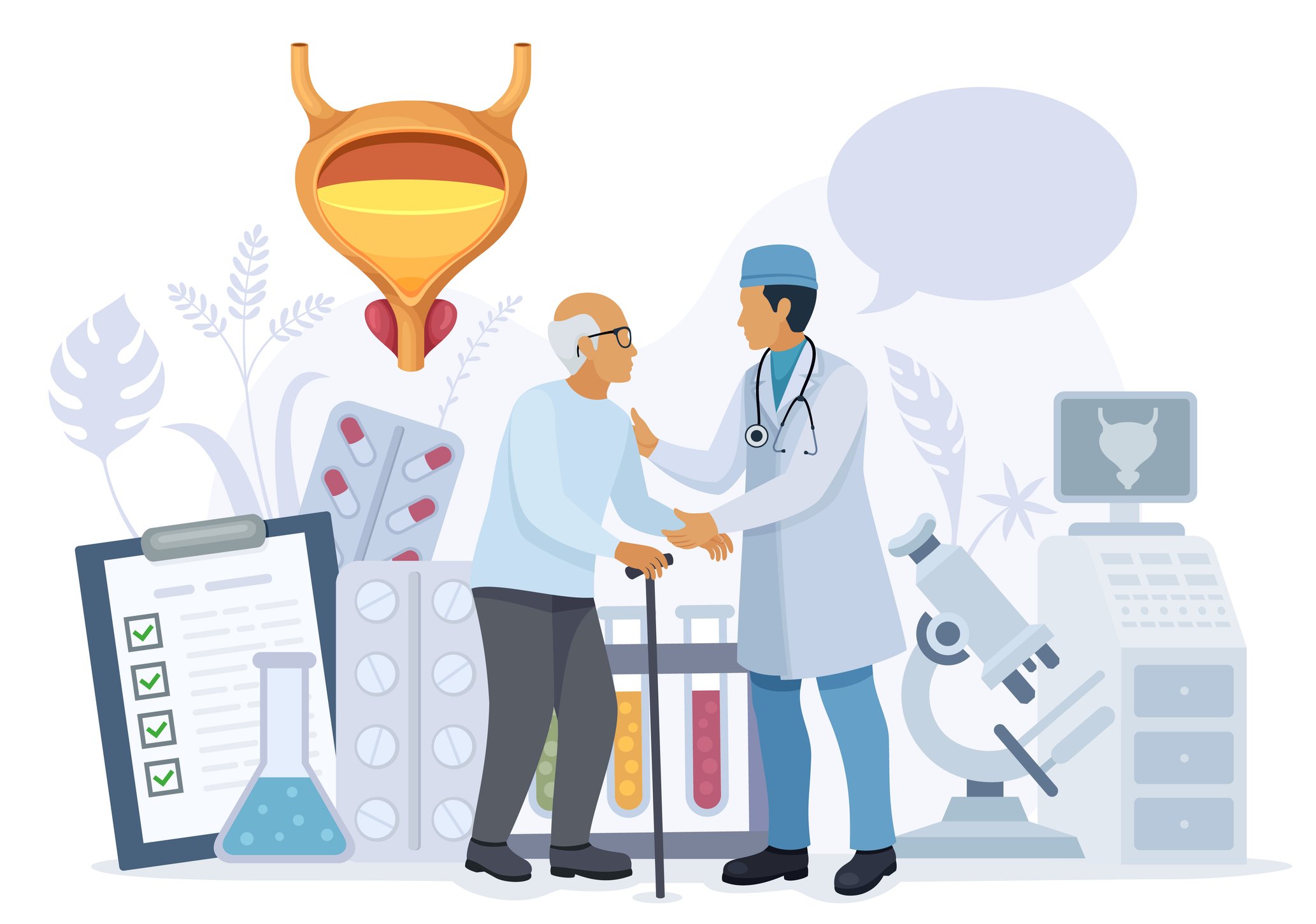What is The Best Treatment for an Enlarged Prostate?
By Libby Pellegrini, MMS, PA-C
September 10, 2025
Prescription Drugs, Your Health & Wellness

What Is the Best Treatment for an Enlarged Prostate?
Benign prostatic hyperplasia (BPH) is a common condition that becomes even more common as men age. In fact, it affects more than one-third of men over age 65. The prostate is a walnut-shaped gland that sits directly underneath the bladder and wraps around the urethra as it exits the bladder. When the prostate gland becomes enlarged, it can narrow the urethra, causing symptoms like decreased urine flow, difficult bladder emptying, urinary frequency, and pain. So, what is the best treatment for an enlarged prostate? Read on to learn more about benign prostatic hyperplasia, supportive therapy and how to treat an enlarged prostate.
What is the best treatment for an enlarged prostate? Common benign prostatic hyperplasia treatments
How to treat an enlarged prostate? There are a number of prostate enlargement treatment methods available. Your healthcare provider can help you decide which BPH treatment options make the most sense for your personal health history and desires. Check out the following BPH treatments below.
Lifestyle changes
You can reduce undesirable BPH symptoms simply through lifestyle changes alone. Experts recommend keeping track of your daily fluid intake and reducing fluids in the evening hours to cut down on nocturia (nighttime urination episodes). You can also limit or eliminate diuretics like tea, coffee, and alcohol from your diet to help decrease frequent urination symptoms. The advantage of lifestyle changes and treatments for BPH is that you can begin them immediately after receiving a diagnosis, and they can instantly help improve your quality of life. The disadvantage is that they might not be effective enough to control your symptoms, and you may need to consider additional treatments as well.
Medications
A number of medications for enlarged prostate can help control symptoms of BPH. Many of these BPH meds can be taken once daily to help medically manage a swollen prostate. The benefit of a prostate medication is that it is a simple pill that you can easily take along with any other medications, and it can make a difference in your quality of life with BPH. However, drugs for an enlarged prostate can have downsides, such as side effects. Also, if you take a medication for swollen prostate treatment, you will likely have to continue taking it indefinitely to control symptoms.
Procedures
A number of minimally invasive procedures can help answer the question, “How to fix an enlarged prostate.” These procedures are beneficial because they are quick, require little to no anesthesia, and have few side effects. However, they may not be effective for symptom relief in the case of very enlarged prostates. A few of the more common procedures for treating enlarged prostate glands include:
- Prostate lift (UroLift): In this procedure, a specialist inserts a device through the urethra to help physically move enlarged prostate tissue and make a wider channel through which urine can flow.
- Temporary implanted prostatic device (TIPD): In this procedure, the provider inserts a temporary device into the prostate to help widen the urinary channel. This is then removed after a week, and the urethra remains reshaped.
- Water vapor thermal energy (WVTT): This procedure uses hot steam to remove excess prostate tissue.
- Transurethral microwave thermal therapy (TUMT): This procedure removes prostate tissue using heat through a microwave antenna.
- Transurethral incision of the prostate (TUIP): In this procedure, the provider makes small incisions through the prostate and bladder neck to help release tissue and widen the urethral passageway.
- Laser procedures: A number of types of laser procedures can also help decrease the burden of prostate tissue surrounding the urethra, which can make it easier for urine to pass.
Surgeries
A surgery is about the closest to a “cure” for an enlarged prostate that you can get. Surgeries can either remove part or all of the prostate gland, helping to permanently relieve symptoms of BPH. However, surgeries are the most invasive option for treating enlarged prostate glands. They can come with side effects such as sexual dysfunction. They also carry the general risks of surgery and anesthesia, such as bleeding and infection. Types of surgery include a transurethral resection of the prostate (TURP), as well as a partial or full prostate removal (prostatectomy).
List of common medications for an enlarged prostate
What to do for an enlarged prostate? Check out the following meds for enlarged prostate, below.
| Medicine | Drug Class | Common Dosage (Adults) | WellRx Savings Card |
| Tamsulosin (Flomax) | Alpha-1 Blockers | 0.4 mg | Link Out |
| Finasteride (Proscar) | 5-alpha reductase inhibitors | 5 mg | Link Out |
| Dutasteride (Avodart) | 5-alpha reductase inhibitors | 0.5 mg | Link Out |
| Tadalafil (Cialis) | PDE-5 inhibitors | 20 mg | Link Out |
Types of benign prostatic hyperplasia medications
There are three main categories of BPH meds that can help treat enlarged prostate glands. Often, healthcare providers will recommend a combination therapy approach to help optimize therapy.
Alpha-1 blockers
This is the most common type of BPH med, and it is often the first-line medication used in treatment for BPH. Medications in this class include tamsulosin (Flomax), alfuzosin (Uroxatral), and silodosin (Rapaflo), though tamsulosin is far more commonly prescribed. These medicines work by relaxing the prostate and bladder neck, which are made of smooth muscle. Side effects of these medications may include dizziness (from low blood pressure) and retrograde ejaculation (a benign condition in which semen goes into the bladder instead of down the urethra). This medicine should not be combined with a PDE-5 inhibitor such as Viagra.
5-alpha reductase inhibitors
This type of medication affects the hormones that cause the prostate to grow. In fact, taking a 5-alpha reductase inhibitor can help decrease BPH symptoms by shrinking the prostate. Medications in this class include finasteride (Proscar) and dutasteride (Avodart). Side effects may include sexual dysfunction, decreased libido, or depression.
Phosphodiesterase-5 inhibitors
While these medicines are often prescribed for erectile dysfunction, they can also be effective for BPH symptoms. Medications in this class include sildenafil (Viagra), tadalafil (Cialis), and vardenafil (Levitra). These medications work by relaxing smooth muscle fibers of the prostate and bladder. They may also help decrease inflammation in the prostate.
When to get medications for BPH?
If you’re experiencing symptoms of an enlarged prostate, such as difficulty initiating a stream of urine, weak urine flow, trouble emptying your bladder, or other urinary concerns, it may be time to consider medications for an enlarged prostate.
When to use other treatments for an enlarged prostate?
If you have trialed BPH treatment options, including medications for an enlarged prostate, and you continue to have symptoms that are affecting your life, you may want to consider other options, such as a minimally invasive procedure or surgery.
What is the best surgery for an enlarged prostate?
When it comes to surgery for an enlarged prostate, there is no single approach that is considered “best” for everyone. The surgery that is best for you is one that fits with your entire medical picture, including your health history, symptoms, prostate features, and personal preferences.
Are BPH meds available over the counter?
No, not in the United States. There are no BPH medications available over the counter. However, some over-the-counter medications (such as antihistamines and cold medications) interact with BPH meds, so make sure to ask your healthcare provider before using over-the-counter medications with prescription medications.
How long do meds for an enlarged prostate take to work?
The answer here depends on the medication class. If you’ve been prescribed a 5-alpha reductase inhibitor, you will likely notice an improvement in symptoms within about six months. An alpha-1 blocker and a PDE-5 inhibitor may take a few days to a few weeks to improve symptoms.
How to take medication for an enlarged prostate
How to treat an enlarged prostate? To take medications for enlarged prostate gland tissue, follow your prescriber’s specific instructions. Some medications, like alpha-1 blockers, may have less noticeable side effects if you take them at a specific time of day, like at bedtime.
Natural remedies for an enlarged prostate
There are a few natural remedies for enlarged prostate glands, including saw palmetto, Pygeum, and rye grass. While some patients may report improvement in symptoms with these natural remedies, the clinical evidence is not established, and they are not FDA-regulated. The most effective way to fix an enlarged prostate likely includes additional therapies.
How to prevent an enlarged prostate
A few lifestyle measures may help you prevent an enlarged prostate. These include:
- Staying physically active
- Maintaining a healthy weight
- Eating a diet high in fruits and vegetables and healthy fats
Get your free ScriptSave® WellRx account and start saving on your medications
| If you have been diagnosed with an enlarged prostate, a prescription may be needed. Make sure to get your free WellRx account and start saving on your medications. The average participant sees up to 80% savings* on prescription medications. |
*DISCOUNT ONLY – NOT INSURANCE. The program is administered by Medical Security Card Company, LLC.
What is the most effective treatment for an enlarged prostate? FAQs
Can benign prostatic hyperplasia be cured?
No, BPH cannot technically be cured. Instead, a number of therapies can help manage symptoms of BPH and improve your quality of life while living with the condition. These include BPH meds, procedures, and surgeries.
What is the latest treatment for an enlarged prostate?
There are a number of new, minimally invasive treatments for an enlarged prostate. These include the UroLift therapy, water vapor therapy, and a catheter system designed to help widen the urethra. Another new therapy that is not a medication or a surgical procedure is called prostate artery embolization (PAE).
What is the Japanese method to shrink the prostate?
A Japanese method to shrink prostate tissue, known as Rezūm therapy, is one of many minimally invasive treatments for BPH. It uses the power of hot steam directed at prostate tissue to help relieve the narrowing and constriction of the urethra. Rezūm therapy represents one brand in the larger category of water vapor thermal energy (WVTT) therapy.
What is the best minimally invasive procedure for BPH?
There are several minimally invasive procedures available for BPH. While one treatment may be best for some, others may benefit from a different approach. Each person’s particular medical history, nature of symptoms, and prostate shape will dictate which procedure will ultimately be best, so make sure to discuss your enlarged prostate treatment options with your healthcare provider.
What is the best drink to shrink the prostate?
There is not a single drink that is the “best” for shrinking the prostate. Some studies have shown that green or black tea may have a helpful effect on BPH symptoms. However, drinking tea or other caffeinated beverages may also worsen prostate symptoms by increasing urinary frequency.
What is the best over-the-counter medication for an enlarged prostate?
There is no over-the-counter medication available for an enlarged prostate. Some studies have shown that certain supplements, such as saw palmetto, may help with enlarged prostate symptoms. However, the evidence on this is mixed.
Does drinking lots of water help an enlarged prostate?
There is no concrete evidence that drinking large quantities of water can help an enlarged prostate. In general, it is good for your health to stay hydrated throughout the day, and this includes prostate health. However, BPH symptoms may worsen if you significantly increase your fluid intake, especially at night.
What is the best vitamin to take for an enlarged prostate?
The best way to support prostate health is to get a wide variety of vitamins from a number of different fruits, vegetables, and other healthy foods. Additionally, some research has shown a connection between Vitamin D supplementation and decreased prostate volume.
What is the 5-second exercise to shrink the prostate?
Maneuvers known as Kegel exercises can help strengthen your pelvic floor muscles and reduce BPH symptoms from an enlarged prostate. To do this exercise, tighten the same muscles you use to stop a flow of urine, hold for five seconds, and release. Repeat this several times daily.
What is the number one food for the prostate?
There is no single best food for prostate health. However, a Mediterranean diet, or one that emphasizes fruits and vegetables, whole grains, and healthy fats (while limiting added sugar and saturated fats), may be linked to better prostate health.
References
https://pmc.ncbi.nlm.nih.gov/articles/PMC4570643/
https://my.clevelandclinic.org/health/treatments/rezum
https://www.cedars-sinai.org/newsroom/a-life-changing-treatment-for-enlarged-prostate/
https://pmc.ncbi.nlm.nih.gov/articles/PMC4003843/
https://www.health.harvard.edu/mens-health/can-supplements-improve-your-prostate-health
Recommended Articles









